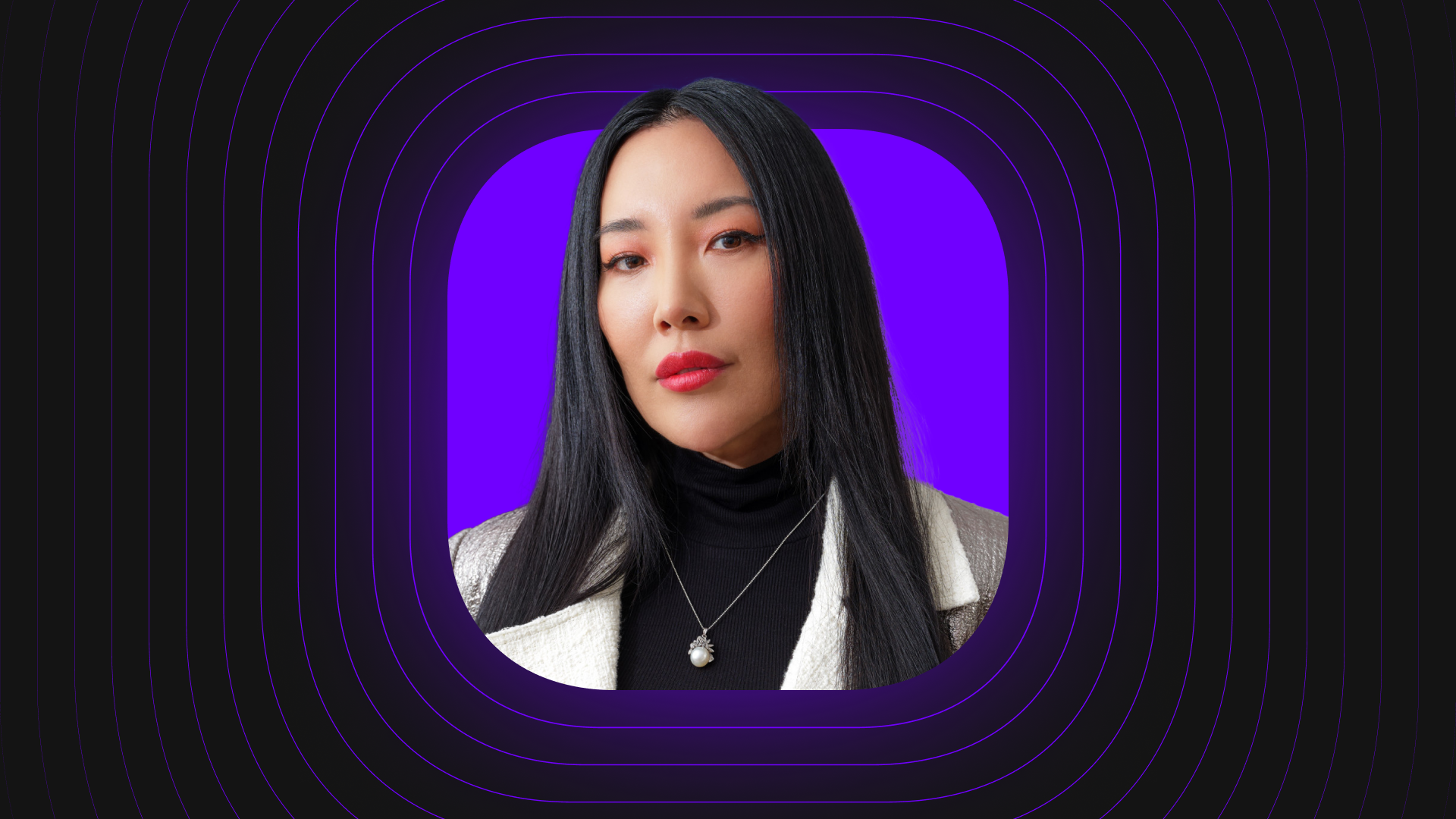"You can't fight technology, but you can put value in it."
Krista Kim about the purpose of the Metaverse's existence, the human right to control your data, and the epidemic of loneliness brought about by web2, which web3 can potentially heal.

Krista Kim, OG.Art ambassador, contemporary artist, co-founder of metaverse innovation lab0.xyz and someone striving to create a better future for the metaverse. Her Continuum artwork was shown on giant screens all around the world– including in Times Square – and is now in the LACMA museum collection.
We spoke with Krista about the purpose of the Metaverse's existence, the human right to control your data, and the epidemic of loneliness brought about by web2, which web3 can potentially heal.
The Metaverse is still a vague concept. How would you define it?
— It's very vague because it doesn't exist yet. We're still in the very early stages of the space. Technically, it's a 3D spatialized internet. A 3D experience that we can experience in virtual or augmented reality. The Metaverse, for me, from a philosophical standpoint, is an extension of the universe itself. I believe that digital code is an extension of the creation of the universe and an extension of human expression. So, the Metaverse is going to become the new frontier of civilization, social engagement, employment, and economies. And very soon, we're going to have a high-fidelity, photorealistic experience on our AR glasses and contact lenses, and Metaverse will become a digital layer of reality.
What is “soon” in this case?
— We're going to exchange incredible scalability for high-fidelity Metaverse within two years max. And after that, we'll be able to scale up to millions of people in the Metaverse at one time.
So, when you really think about the possibility of bringing millions of high-fidelity avatars into the Metaverse, then you have to consider why they are there. What's the purpose of the Metaverse's existence? Why would people engage in it? I believe that they would engage because it adds value to their lives through education, health, wellness, entertainment, community and art.
Could you tell us about 0.XYZ healing metaverse project that you're building?
— We are an innovation lab and production studio for Metaverse projects. Our focus is on education, health, and wellness. I'll give you an example of one of the projects we're working on in collaboration with Dr. Sweeney Pulay, a Harvard-trained psychiatrist and neuroscientist. The project is called Reulayverse, and aims to create science-backed art installations that lower anxiety and stress. It is scientifically proven that these art experiences can actually alter our mental state and our physiological condition.
Will it be public art?
— Yes, it's going to be accessible. The reason why the Metaverse is so exciting for me is that it can offer solutions for affordable, accessible mental health experiences and maintenance as a lifestyle.
When you say that your other focus is education in the Metaverse, what kind of projects do you mean?
— First of all, I have two teenagers, and taking them away from their video games can be a real challenge. I know that this is a question for parents around the world: “How are we going to educate this new generation when they're so absorbed in entertainment and gaming?” I think the answer is to turn education into immersive experiences that are inspiring and emotional.
You can't fight technology, but you can put value in it. Take, for example, Martin Luther King Jr.’s speech on Capitol Hill: ‘I Have a Dream’ — imagine you're taken back in time by experiencing the speech in VR — the mood, the whole 360 degree environment, and all the crowds on Capitol Hill at that moment! Education is no longer textbooks and what you read—it's about what you experience.
But that sounds really expensive: the shooting and production.
— And this is why scalability is key in the Metaverse. This is why we need millions of people to be in the Metaverse to make it a viable business and affordable public good.
I want school kids to visit the inside of the pyramids, to go deep into the basement and see what's there. Or to show them the Amazon forest and have them educated by the indigenous community on the rainforests'' beauty, medicinal value and the necessity to support and protect them. These are the kinds of projects that are very web3 and only accessible and effective as Metaverse projects.
In your TEDx talk on Time Square, you emphasize that today we all live in a post-COVID reality. How did COVID change us?
— Before COVID, people were just running blind on a treadmill, without taking a break to actually think about their lives in a mindful way. With digital technology, we are always bombarded with information, we're always in demand, and that's not good for our mental health. COVID shut everything down, so people actually had time to think, and for many people, that was a very strong mental health practice.
Do you see COVID as a healthy moment for our society?
— A lot of people suffered, obviously, but in that suffering, a lot of people came to healthy realizations and lifestyle changes. Moving out of the cities, living a more balanced lifestyle, and spending more time with family – really appreciating family because so many family members have died or were sick.
I think that we are all collectively more empathetic, caring about our health and actually caring about the wider world since we all suffered together. It was a unifying experience, oddly enough. And so, I think that now people are much more cognizant and mindful of where technology's going and how it can serve us. Instead of just blindly accepting it as it is, let's actually have a voice and impact on how technology is evolving for our benefit as human beings.
Your own response to COVID was building Mars House — a beautiful VR space. It made me think that the Metaverse might also become this fictional escape from the problems and the difficulties of the physical world, like in dystopian literature and films. I wonder what you think about this possibility.
— There's escapism in the real world, too. That's why people fly to Hawaii or to Italy. But the Metaverse actually makes that very easily accessible when you need it.
I think that it's beautiful for people to be able to access spaces that are inspiring, that actually make them feel good, and then meet other people in those spaces. The question is, how do I express myself as an avatar, a digital human, and what does it mean to be human in the digital age? There is an opportunity to express yourself through your avatar, be authentic, and participate in dynamic global communities and DAOs that are building the future.
So, it's not just escapism; it's a unique, incredible opportunity for people to really be able to have a say, find a greater expression of who they are, find community, and end loneliness. During web2, loneliness became an epidemic—there are more lonely and depressed young people than ever before in human history because of social media platforms. We are more connected than ever, but we are lacking human connection. Web2 technology is not designed for empathy and shared experiences, but the Metaverse can be. That’s the big difference.
Colborn Bell, the creator of the Museum of Crypto Art, is concerned about tech oligarchies like Facebook and other giant digital companies trying to push people into an even more consumeristic Metaverse, in order to collect our data and treat us like products. Do you share these concerns?
— I do. The whole reason why I was so excited about blockchain and became an early adopter was because I have been paying attention to data sovereignty. The surveillance capitalism economic model of web2 is based on companies taking our data without our permission and reselling it for trillions of dollars. This is a goldmine for these companies and it's violating our human rights because data is power. Data sovereignty is not recognized as a human right yet, but it should be written in the Human Rights Code that we control our own data. I believe that an open, decentralized Metaverse will allow every user self-custody of their data through a universal wallet system, and if individuals want to license their data to a third party, they could be paid for it directly. That would be fair.
Within the next couple of years, you're going to see more data sovereignty protocols, causing a major turning point for individual empowerment and a paradigm shift for web3.
I also think that in the Metaverse community, engagement is everything. I don't believe that a purely commercial play is going to work in the Metaverse because people are not interested in visiting a shopping mall in the Metaverse, that's boring, and we don't need that. What we need is more inspiration, education, storytelling and art. We need health and wellness and group therapies. We want to meet incredible minds, be inspired and make our real life better through the time that we invest in the Metaverse. That's what's important.
You see people as very conscious beings, but in real life, we don't always manage to be. So what will help us do better in virtual life?
— The introduction of the internet was a huge change in our world. And now, the change is blockchain and the Metaverse. If you set examples of using technology in a meaningful way, adding value to our lives, people will actually continue in that pattern, you just have to show them it is possible. And that's the beauty of what art can do, it shows you all the possibilities that weren't there before. I hope that through art and community, we can inspire others to really live their best lives.
You can't create radical change overnight—Rome wasn’t built in a day. Today, everyone's trying to learn and understand what web3 is all about. Companies like Meta have a huge user base of billions of people, and I believe that there is no harm in trying to advocate and influence these companies positively so that they follow the web3 model, adjusting to it and becoming more community-minded. But you can't expect them to make a full shift overnight.

In 2014 you founded the Techism movement or ’Digital humanism.’ What ideas do you try to promote?
— Back then, suffering from anxiety and depression myself, I recognized the exploitative nature of technology and social media, its parasitical ability to make people addicted to likes, promoting egotism, narcissism, and competition. It's not good for our mental health. So, I realized that we needed more art and more artists to collaborate with engineers, technocrats, and entrepreneurs and to engage with the leading technology to make it more humane.

